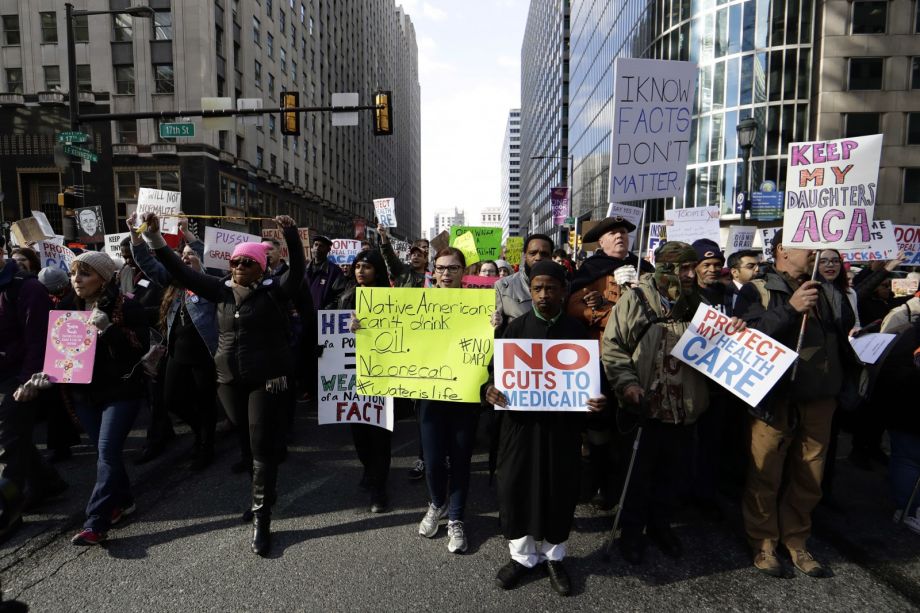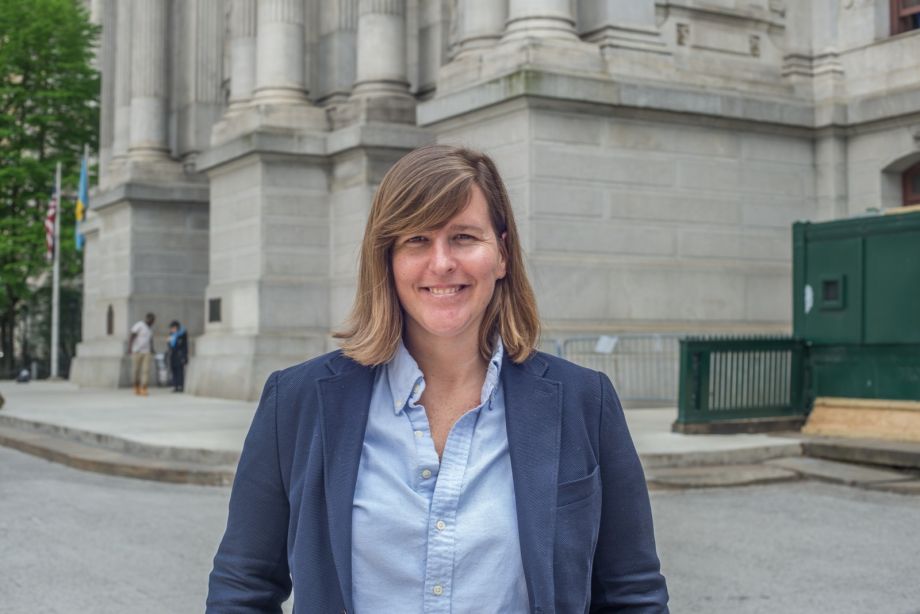Are You A Vanguard? Applications Now Open
Lauren Hansen-Flaschen and Anton Moore (Photo by Joshua Scott Albert)
This is your first of three free stories this month. Become a free or sustaining member to read unlimited articles, webinars and ebooks.
Become A MemberHave you heard the one about millennials running for local office? That’s not a joke. I’m really wondering. Because if you’ve lived in Philadelphia for the last decade, you’ve likely heard or read a story that gets regurgitated in the press every few years. It goes something like this: Young people don’t care about politics — not local politics, at least — but watch out for this scrappy group of newcomers, full of piss and vinegar, eager to change the way the city runs. There’s a graveyard of acronyms that once belonged to organizations billed as the Great Millennial Hope. From the Center for Progressive Leadership (CPL) to the Philadelphia Democratic Progressive Caucus (PDPC), upstarts have emerged and disappeared over the years, with little to show for their goal of getting young Philadelphians to run for seats on City Council or in Harrisburg.
In 2014, there was a twist on the familiar refrain. The Tea Party had disrupted politics, establishment outsiders were thriving — and another kind of political dynamism started to bubble in Philadelphia. A mob of young, good-government progressives ran for the most entry-level elected office in the city, an unpaid position known as “committeeperson.” Many were intent on disrupting the power structure of Philly’s political wards and a Democratic Party long criticized for a lack of transparency and enduring machine-style methods.
One of those first-time candidates in 2014 was Nick Marzano, then 31 years old. “I saw that there was an open committeeperson spot in my neighborhood and I went for it,” Marzano recalls.
I’m going to tell you what happened to Marzano, but first, a bit about Philadelphia’s ward system, which can feel intimidating and esoteric. Philadelphia has a total of 1,686 voting divisions, which dictate where residents vote on election day. The major parties have grouped these divisions into 69 geographic wards of similar-sized populations. Within each voting division, there are two committeeperson seats per major party, elected during primary elections. While the responsibilities of committeepeople are ill-defined, there are generally two expectations. The first is to perform get-out-the-vote efforts each year within your division. (One method: Distributing flyers around election time listing recommended candidates up and down the ticket.) The second is to vote for a ward leader — who in turn votes for the chairman of the local Democratic Party, which has been held by U.S. Rep. Bob Brady since 1986. You get the idea. The typical jab at committeepersons charges that they’re pawns for the politically powerful.Prior to his bid, Marzano was not a seasoned politico. He wasn’t even the type to frequent protests or canvas for candidates, he says, but he wasn’t apathetic. Already two months into his term as president of Young Involved Philadelphia, a group of civic-minded millennials, he started knocking on doors in Philadelphia’s gentrified Second Ward. “Because they’re hyperlocal, the [committeeperson] races are eminently hackable,” he says, using a phrase that separates him from the majority of residents, largely boomers plus, who’ve held the posts for years.
Marzano prevailed with five write-in votes.
Three years later, however, that would-be insurgency looks more like an unactivated sleeper cell. Marzano, like a lot of 2014 first-timers, is no longer serving in the Second Ward; he vacated his seat when he moved to another neighborhood. Another group of newcomers, having seen inside the machine, aren’t sure if they’ll run for reelection.
Cue the fizzling of yet another round of “engaged millennials” articles … but then November happened.
U.S. President Donald Trump’s election has generated a groundswell of interest in running for committeeperson from political neophytes. In turn, that’s spurred a fresh round of headlines about how millennials are going to run for office and revolutionize Philadelphia.
As in 2014, the inspiration for change seems to be mostly political. Advocates talk about removing “rotten ward leaders” and building a bench of new candidates. But in the aftermath of such an unprecedented — by so many accounts — presidential election, what if, this time, in Philadelphia too, things are different?
“There should be a mythology around this position. Instead it’s covered in dirt or muck, because it’s seen as something so narrow and connected to the party,” says Omar Woodard, 33-year-old executive director of anti-poverty nonprofit GreenLight Fund (and a man who’s constantly asked when he’ll run for office). “If [committeepeople] were used for the right purpose, the infrastructure would create tremendous civic outcomes.” It’s true. A committeeperson has the potential to be the connective tissue tying together the city’s social and political spheres, a conduit between the eminently powerful (but not popularly elected) ward leaders and constituents on the block.
Getting there won’t be easy. But the idea of invigorating the committeeperson job with fresh civic purpose could do more than just kickstart a resurgence of grassroots energy in local politics. Numbers alone give the City of Brotherly Love an advantage in youthful passion: The city outpaced all others in the U.S. from 2007 to 2015 when it came to attracting millennials, with a 32 percent increase, according to census data analysis by real estate firm JLL in December. If enough of these relative newcomers buy in, the impact could ripple — and give more millennials something tangible and worthwhile to cling onto in Philadelphia politics.
On a Tuesday night in February, at a chic co-working space in downtown Philadelphia, about 100 people watched a presentation on how to run for elected offices, especially committeeperson. There was craft beer and pizza, and the ticketed event was titled “Get Mad, Then Get Elected.” It was the sequel to a November session, both organized by Philadelphia 3.0, a two-year-old political action committee that supports candidates trying to upend incumbents.
Less than 30 days into the Trump presidency, there was optimism in the room. Wide-eyed professionals thinking about career changes — into nonprofits or politics, and away from the private sector —soaked in advice from current committeepeople who made the jobs seem reachable: Collect 10 signatures, spend three hours knocking on doors, and voila, you’re on the ballot. Nuggets of insider information were shared (beware of frozen ink in your pens when you’re out gathering signatures) and warnings laid down (terms for committeeperson are four years — longer than U.S. Congress or City Council members). Everyone was enthused, though the next election isn’t until 2018.
“People came to us because they were upset with an election at literally the highest level, and we’re saying the best way to have an impact is to get involved at the lowest level,” says Ali Perelman, executive director of Philadelphia 3.0. In a proverbial “one-party” town, where registered Democrats outnumber registered Republicans 7 to 1, there’s only one locus to make a difference in politics, says Perelman. “In Philadelphia, if you want to have an impact, you have to be a partisan — in a moment when being a partisan just isn’t cool.” Still, hundreds of people have turned out for 3.0’s events.
They’re not the only ones on the scene. The first how-to-run seminar held by the Philadelphia Democratic Progressive Committee (the newest org to have the PDPC acronym), a nascent political action committee, drew more than 400 people, two-thirds of them millennials. In an effort to do outreach beyond downtown, PDPC has been hosting training sessions across the city: On a Monday evening in February, more than a hundred people sat in metal folding chairs in the basement of Mount Carmel Baptist Church in West Philadelphia. “Something different is happening all over,” Dennis Lee, a former deputy city commissioner and member of PDPC, told the audience.
They aren’t the first groups with this idea of course. Well before Trump’s victory activated regular protests across U.S. cities, the committeeperson seat has been eyed by those looking for change — and those who believe a better-informed public is the key to bringing fresh blood into the elected sphere. As far back as the early 1970s, progressives in Philadelphia have ruminated over these oft-vacant posts. In 2014, the National Organization of Women (NOW) tapped a few Philadelphians to run nonpartisan how-to symposiums on the ins and outs of ward politics. Their efforts were duplicated by local civic-minded groups like Marzano’s YIP and the Philadelphia Democratic Progressive Caucus (the old PDPC), which published a map of how many people had registered for committeeperson in each of Philadelphia’s 1,686 voting divisions, and identified ones ripe for write-in candidates.
And with anger now directed at Washington, focusing people on local offices can be tough. “Frankly, it’s a different avenue than most people are taking, protesting in the streets,” says Joe Driscoll, one of the organizers behind the Philadelphia Democratic Progressive Committee. But he argues, the neighborhood-level seats, are something concrete. Committeepeople are not just about becoming a representative of the party; they’re about representing your neighborhood to the party. At a time when registered independents are rising in Philadelphia, Driscoll believes that a wave of people running for committeeperson is a way to reverse the waning confidence in the party writ large. “In 2014, more people ran for committeeperson than ever — according to historical records we have access to,” he says. “What we’re looking at is an upward trajectory of people smarting up and saying, look, I have to get involved if I want change.”
Marzano has a few words of advice for any first-timers looking to run for committeeperson: “It’s not all about infiltration and blowing up the machine.”
Put another way, the momentum to get fresh faces in these seats has the potential to be about so much more than just politics. Indeed, an influx of people elected to the seats could revolutionize the position itself.
In theory, committeepeople are not just foot soldiers for Philadelphia’s 69 ward leaders. But their abundance — there are 6,744 committeeperson positions in all — exists in relative obscurity, out of sight from public scrutiny. You’d be hard-pressed to find a Philadelphian who can identify what they actually do. Many committeepersons aren’t involved in their neighborhood at all. Some allegedly don’t even live in their voting divisions anymore, which is supposed to result in a vacancy that’s then filled by the ward leader but, when terms are four years long, who exactly is combing the list of committeepeople to check regularly? Some hang onto the position as a political favor to the ward leader, voting in his or her favor every four years but otherwise remaining invisible.
In her book, “The Green Shoots of Democracy in the Philadelphia Democratic Party,” Karen Bojar suggests the role of committeeperson has devolved into perpetuating the status-quo power structure of Philadelphia’s one-party dominance:
The closed, top-down wards associated with big city political machines have sometimes been defended in terms of their historical role providing services for the poor and acculturating recent immigrants. But if the top-down undemocratic machine did at one point serve this purpose, that time is long gone. Now we have the top-down undemocratic machine with no redeeming social purpose.
If reaching back to the 19th century for examples of more holistic committeepersons might seem like a futile exercise — well, that Romantic ideal isn’t even as sweet as it sounds. While committeepersons of yesteryear may have been more socially charged and visible in their neighborhoods, they were still very much part of the machine, Bojar warns. “Yes, they would hand out some favors and do a few good things, but overall, I’m not so sure that they advanced the cause of the people,” she tells me.
In other words, the job has always primarily been a function of political power. Mayor Richard Daley in Chicago enlisted committeepersons for machine-style, get-out-the-vote efforts, for example. But that’s not to say being a committeeperson couldn’t be something more.
“You can make it as big as you want to. If you want to become a community ombudsman you can,” says Bojar, who’s held a seat in Philadelphia’s Ninth Ward for 31 years.

Demonstrators march in Philadelphia during a visit by President Donald Trump in January. (AP Photo/Matt Slocum)
“Committeeperson is only a title,” Moore says, “It doesn’t hold any real weight. It doesn’t have any real influence, unless you’ve got people who are really sincere about wanting to see their community do better.”
Fostering a new-look committeeperson would seem to be well-suited for the tastes of millennials. After all, people who’ve studied the generation have found millennials to be more community-oriented and service-oriented, conceptually speaking. Committeeperson is a fundamentally volunteer and self-starter role. For Bojar, the ultimate goal is to get young people to stop thinking about politics as a dirty business. Despite the so-so returns on the revolution of 2014, she’s hopeful that this moment beckons the promise of change. “When I wrote the book, I was very hopeful about the green shoots of democracy and now I’m certain something is going to happen.”
While how-to-run-for-committeeperson training sessions that’ve taken place since November, all across Philadelphia — from Center City co-working spaces to West Philadelphia church basements — have been well-attended, it will be years before we understand if this moment marks a local political movement or whether it’s just an outlet for ephemeral anger and anxiety.
“I’m skeptical it will lead to more candidates,” Woodard says. While he strongly touts the belief that in order “to fundamentally change Philadelphia, it has to occur at the block level,” he has also seen similar moments come and go in this city before. Groups like the Center for Progressive Leadership, YoungPhillyPolitics.com and the Philadelphia Democratic Progressive Caucus all had their 15 minutes of fame as the group that would galvanize young Philadelphians to run for office. In 2017, they’re all in various stages of defunctness.But if the committeeperson role could be infused with greater social responsibility, it’s hard not to imagine a trickle-down — or maybe, trickle-up — effect. “You can start there [with the committeeperson job] and model up what it means to be doing public service on the ground,” says Woodard. “You’ll have people seeing what real engagement — between people and political parties — looks like. If it’s not modeled well there, then it won’t be modeled well anywhere else.”
That’s not to say Philadelphia needs to drain the swamp of all its committeepeople. It’s not even to say that most of them are doing a poor job. But the decidedly older demographic occupying the seats means that change is, imminently, on the way. “The whole system is breaking down, because so many of the committee people are in their 60s, 70s and 80s,” says Bojar. Are young people ready to quit bowling alone and finally participate in local politics at the level of, say, committeeperson? Beyond local precedent, there’s an abundance of headwinds working against the idea. Marzano’s case is telling. When he was elected in the Second Ward, he was a renter, meaning his year-to-year residence was at the mercy of so many factors (namely, affordability). Once he left, the ward leader got to appoint whoever he wanted to replace Marzano, and good-government progressives have to wait until 2018 to try again.

Lauren Vidas (Photo by Joshua Scott Albert)
There are more positive signs. In its first three months of existence, RunForSomething — a brand-new group that sprung up in January with the goal of training more millennials to run for offices at the state and local level across the U.S. — received 5,000 registrants and oodles of press. In Philadelphia, when YIP held a “Born to Run” event a week before Thanksgiving, 275 people attended. Before November 9, only 30 registrants had signed up.
And even if this doesn’t turn out to be a political moment, that doesn’t mean it can’t yield another kind of positive change either. “If [millennials are] encouraged to take positions like [committeeperson], they’re going to stick around a little bit longer,” says Lauren Hansen-Flaschen, 35. She, too, ran for committeeperson in 2014, and lost (despite garnering 42 votes), but has since become vice president of her local civic association in West Philadelphia. “They’re going to be a little more invested in the city and care about what’s happening now or in the near future.”
Next City’s coverage of Philadelphia’s changing neighborhoods is made possible with the support of the William Penn Foundation.

Malcolm was a Next City 2015 equitable cities fellow, and is a contributing writer for the Fuller Project for International Reporting, a nonprofit journalism outlet that reports on issues affecting women. He’s also a contributing writer to POLITICO magazine, Philadelphia magazine, WHYY and other publications. He reports primarily on criminal injustice, urban solution and politics from his home city of Philadelphia.

20th Anniversary Solutions of the Year magazine